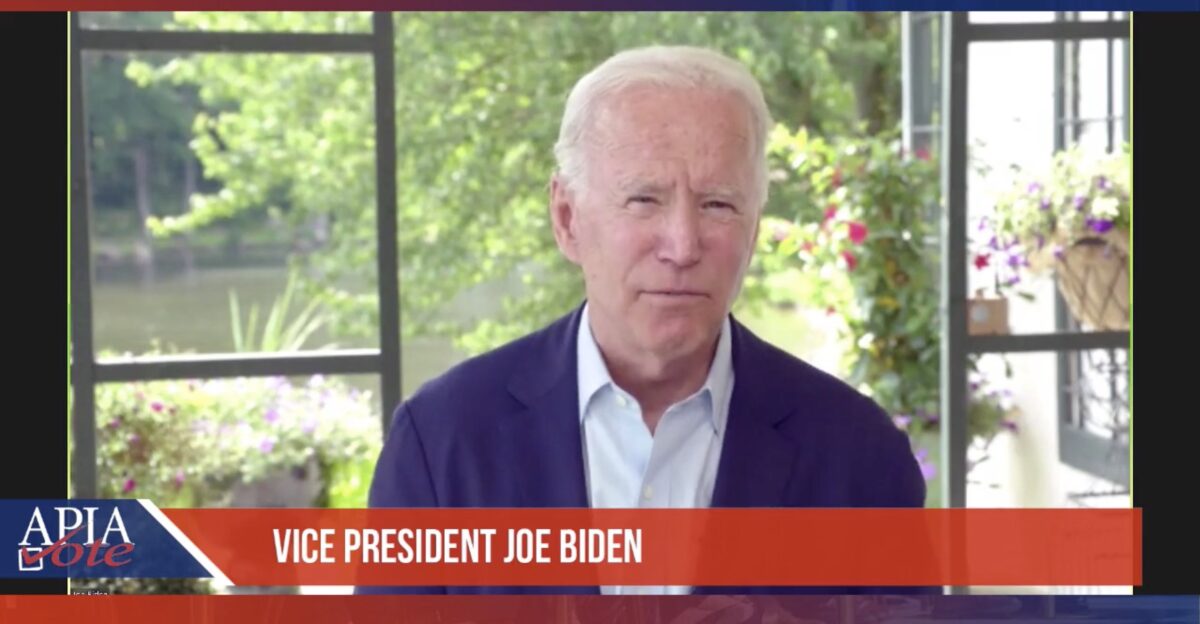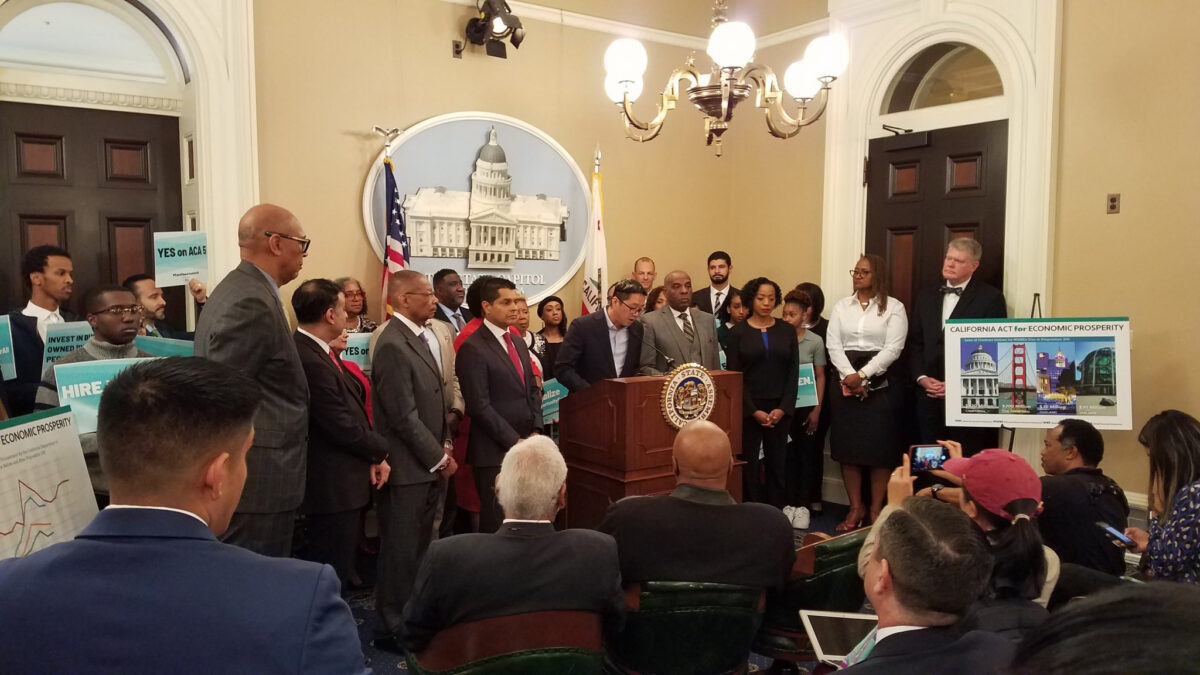Former Vice President and presumptive Democratic presidential nominee Joe Biden pledged at today’s AAPI Presidential Townhall that he would release a report on the diversity of his campaign staff. Immediately following the event, his campaign issued a report showing that more than one-third of staff (including one-third of senior staff) are people of colour, and more than half are women.
Biden has faced criticism in recent days for failing to disclose the diversity of his campaign staff despite boasting during the primary that had “the most diverse campaign staff of anybody running.” Critics have pointed out that Biden’s top advisors appear to be mostly white. As recently as a few days ago, Biden’s campaign has inexplicably refused to release its diversity numbers. With today’s announcement, Biden’s campaign reported 36% of people working in leadership roles are people of colour, and 58% are women. Biden’s campaign further noted that several senior staffers are Asian American and/or Pacific Islander, including his Chief Financial Officer, Chief Operating Officer, National Voter Protection Director, Digital Chief of Staff, Director of Digital Partnership, and Surrogates Director.
Less than a day after Biden’s campaign released their diversity report, Trump’s campaign also released a report on staffer diversity. Trump reports that 52% of his campaign’s senior staffers are women, and 25% are people of colour.
Former Vice President Joe Biden opened his nearly hour-long appearance by highlighting a recent New York Times report that Russia had placed bounties in Afghanistan on US military personnel; Biden asked how in light of these and other reports Trump could continue his cozy relationship with Russian president Vladimir Putin.
Biden’s campaign reported 36% of people working in leadership roles are people of colour, and 58% are women. Biden’s campaign further noted that several senior staffers are Asian American and/or Pacific Islander, including his Chief Financial Officer, Chief Operating Officer, National Voter Protection Director, Digital Chief of Staff, Director of Digital Partnership, and Surrogates Director.
In subsequent question-and-answer periods, Biden demonstrated surprising fluency in Asian American and Pacific Islander issues. This is a far cry from earlier appearances at AAPI-facing events where Biden has struggled to appear in touch with AAPI communities: for example, comedian Hari Kondabolu recounts in his album Mainstream American Comic how at one Asian Pacific American Heritage Month event held during the Obama years, Biden repeatedly referred to attendees as “Asian Pacific people”.
At today’s townhall, Biden smoothly navigated several tough questions raised by moderators and AAPI community members, and he made several important promises. In addition to releasing his campaign diversity numbers, Biden vowed to establish a “roadmap to citizenship” for undocumented immigrants, protect H and J work visas, prioritize ethnic disaggregation of Asian American and Pacific Islander data, improve language access for Affordable Care Act materials, and both restart and expand the White House Initiative on Asian Americans and Pacific Islanders (WHIAAPI) that was created under the Clinton administration.
Biden further criticized the President for promoting anti-Asian racism in the context of COVID-19, saying: “Words matter. The president’s words matter even more.” Unfortunately, Biden was not asked to address his own recent campaign ads that seek to portray him as ‘tougher’ on China than Trump, and how such ads might also exacerbate anti-Asian violence.

While President Donald Trump spent today golfing, his campaign was represented at today’s townhall by former Governor of Guam Eddie Baza Calvo. When asked why Trump himself chose not to appear, Calvo said the campaign felt it was more important to have a member of the AAPI community represent the president at today’s townhall. Calvo went on to describe himself as both Asian and Pacific Islander because Guam is a Pacific Island located south of Japan and because he has “several races in his blood.”
Biden further criticized the President for promoting anti-Asian racism in the context of COVID-19, saying: “Words matter. The president’s words matter even more.”
Calvo was questioned on Trump’s stance on racial diversity, and specifically on Trump’s recent usage of the racist term “kung flu” to refer to the novel coronavirus. Calvo responded by falsely suggesting that the phrase “kung flu” originated under Obama. (It did not; it was never used by an Obama administration official, and the novel coronavirus didn’t exist during Obama’s presidency.) On topics of diversity, Calvo argued that we should look to President Trump’s words, and not his action. He then falsely suggested that Trump’s cabinet is among the most racially diverse in history (it’s not), and that under Trump’s second term, AAPIs — including Elaine Chao and himself — may serve in the president’s Cabinet.
Calvo suggested that Trump will expand healthcare coverage by reducing healthcare costs and allowing patients to access untested and potentially dangerous drugs through private pharmaceutical companies, while protecting healthcare coverage for patients with pre-existing conditions. (Trump has in fact tried to eliminate the Affordable Care Act, which grants protections for patients with pre-existing conditions.)
When asked about how Trump will address systemic racism in his second term, Calvo highlighted public school reform efforts and expansion of Pell grants to include incarcerated students. (Overall, Trump proposes to cut education spending by over $5 billion, including the elimination of Federal Work-Study and student loan forgiveness programs for graduates working in the public sector.) Calvo then suggested that systemic racism may be best addressed at the state and local level, rather than by the federal government.
Throughout the time when Calvo was speaking at today’s townhall, Trump was active on Twitter, tweeting attacks on Joe Biden and police wanted posters of street protesters.
Launched in 2008, the AAPI Presidential Townhall is the largest AAPI-facing event for presidential candidates. Today’s townhall — the fourth such event organized by APIAVote — was sponsored by over 250 community advocacy groups and live-streamed through Facebook. It featured opening remarks by Congressional Asian Pacific American Caucus (CAPAC) chair Rep. Judy Chu, and was moderated by PBS’ Amna Nawaz and NBC News’ Vicky Nguyen. I live-tweeted the event, and that thread can be found here.
The AAPI electorates are the fastest-growing populations of eligible voters in the nation, and are poised to be crucial swing voters in several electorally contentious states this year.
Update: This post was updated on June 28 to include diversity numbers from the Trump campaign.
Correction: An earlier version of this post mistakenly attributed the creation of WHIAAPI to the Obama administration. WHIAAPI was first established by the Clinton administration in 1999.


